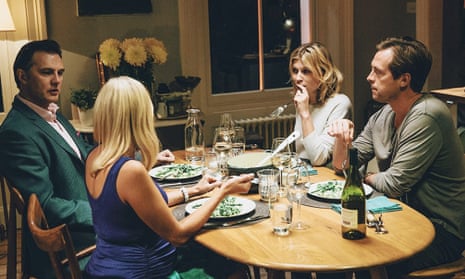There is a delicious and elegant nastiness in this psychological suspense thriller from British writer-director David Farr, a stage director now making his feature film debut, having already written widely for cinema and television.
The Ones Below is an intimately disturbing nightmare of the upper middle classes, with tinges of melodrama and staginess, entirely appropriate for its air of suppressed psychosis. The north London setting has an interesting and rather retro look — a world where milk gets delivered in glass bottles. It’s the kind of London that Roman Polanski showed us in his 1965 film Repulsion, and the four-way chamber music of dysfunction is a little like Polanski’s 2011 version of Yasmin Reza’s play Carnage.
Two professional couples find themselves living in close proximity. Justin (Stephen Campbell Moore) and Kate (Clémence Poésy) live in the upper half of a converted Edwardian terrace house in Islington; Justin is in graphic design and Kate is taking maternity leave from her research job, because she is pregnant. They are an amiable, laidback couple, whose only domestic worry that the flat below them and its big garden had been falling into disrepair from being left untenanted for so long.
So they are initially relieved when a new couple moves in and everything down there is instantly fixed up with fastidious attention to detail — especially that garden which they look out onto. This becomes an almost astroturfed place of fanatical and almost sinister neatness, and Justin and Kate notice the newcomers have a prim habit of leaving their shoes actually outside their front door on the mat. They are the very sexy young Teresa (Laura Birn) and her fiercely uptight older husband Jon (David Morrissey), a wealthy banker; Teresa has no intention of being anything but a pampered stay-at-home wife and gruffly conservative Jon would not countenance anything else.
The strange thing is that Teresa is pregnant as well; there is an eerie parallel between the couples’ lives, and at first there is a cautious diplomatic friendliness between them — Justin and Kate invite Teresa and Jon up for supper. But where Justin and Kate made their decision to get pregnant almost casually, having established their professional careers first, Jon and Teresa reveal they have trying for their baby for seven desperate years. Getting pregnant had been everything for them. This difference in attitude causes immediate unease — as if Justin and Kate are casual about something precious that their neighbours have been yearning for so desperately.
Initially, Kate tries being best friends with Teresa, using their pregnancy as a bond. But Farr interestingly shows how Teresa has the rich person’s charm — entitled and manipulative. When Kate is just about to pop out shopping, Teresa impulsively asks her to come swimming at her private club instead; Kate’s good nature and good manners mean she somehow can’t refuse and Teresa airily dominates the conversation, then at the end of swimming dashes off early to an almost-forgotten lunch meeting with her husband, leaving Kate behind in the club changing rooms — thus not-so-subtly establishing her social dominance in an apparently informal situation. But she has revealed enough to show Kate that Teresa’s life is not as picture-perfect as she claims. As for Justin and Jon, there is no attempt at friendship, more a wary mutual regard. But a terrible catastrophe occurs midway through one of their painfully well-meant attempts at neighbourliness, and the new downstairs couple become their undeclared enemies, waging a new war of psychological parasitism.
The film has something of Patrick Hamilton’s drama Gaslight, and and it reminded me of the Hollywood domestic-menace movies like Fatal Attraction (1987) and more particularly The Hand That Rocks The Cradle (1992) — where there is in fact a specific plot similarity. Farr cleverly exploits the obvious anxiety and unease involved in simply being pregnant, the need for cocooning and privacy of the kind often unavailable in the big crowded city. There is also the unspoken fear of post-natal depression, and fear of personal failure.
The Ones Below has some plot issues: there is some strained business with a spare key — shades of Dial M For Murder, perhaps — and it isn’t entirely clear why a banker as wealthy as Jon should live in a relatively modest flat. But messy business with spare keys is the sort of thing that happens in real life and maybe Jon isn’t as wealthy as he claims. It is a thoroughly gripping, horribly absorbing movie.

Comments (…)
Sign in or create your Guardian account to join the discussion